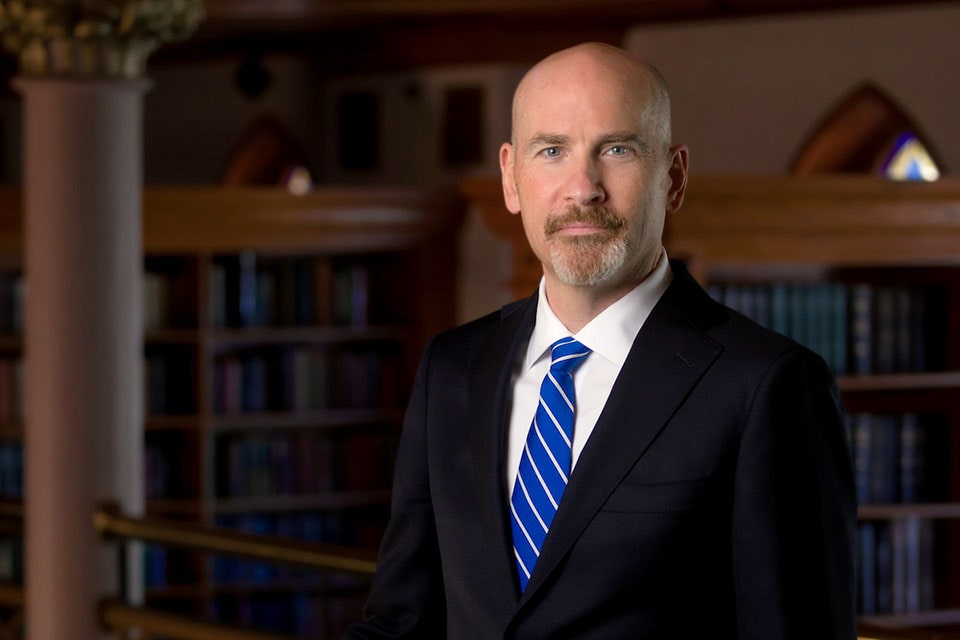For Lear Rose, navigating accommodations at Saint Louis University has been strenuous. Diagnosed with severe dyslexia, dysgraphia and dyscalculia, Rose relies on assistive technologies like a screen reader and voice typing to access reading materials and complete assignments. However, when Rose recently sought accommodations for a business law class, they said the professor made ableist comments inside and outside of class. Instead of receiving support, Rose was simply removed from the class.
Rose’s experience reflects a larger issue at the university. Students with disabilities say they face persistent barriers to obtaining accommodations that they are legally entitled to under the Americans with Disabilities Act (ADA).
From faculty misunderstandings, pushback and lack of training to a strained accessibility office struggling to meet demand, students are finding that the path to equitable education is far more complicated than it should be.
Rose makes it a habit to initiate clear communication about their accommodations, and has only had a few minor problems with professors. Once they enrolled in an introduction to business law class this year, the professor’s reaction was much more abrasive than expected, according to Rose.
“He essentially tried to convince me to not use my academic accommodations, calling them unreasonable,” Rose said, referencing a Zoom call where they communicated their accommodations with the professor. “He also stated that I was an inconvenience in the classroom environment and that I somehow threatened the value of his teaching.”
To accommodate the challenges Rose faces as a disabled student, they require a screen reader, triple testing time, an in-class notetaker, computer use in class and access to PowerPoint slides. The PowerPoint slides and in-class notetaker are accommodations that the professor specifically has to arrange.
“He called it ridiculous and said that he would see how the first exam went, but he will not give me the full amount of time if I do not need it, which, of course, I did,” Rose said.
Rose was denied all accommodations in that class except for the use of an in-class computer and extended exam time.
Jack Carningan had a similar experience. A junior majoring in computer science, Carningan started noticing difficulties with his attention span in an operating systems class in 2022. After seeing various ads and videos about ADHD and ADD, Carningan was assessed and subsequently diagnosed.
“With a lot of my classes, I felt like I was being lazy or wasn’t smart enough to understand the material. It’s like, no, I have a genetic condition where I’m predisposed to have low dopamine, which is an essential neurotransmitter for self-regulating your executive functions like focus, sleep, eating and mood,” Carningan said.
After receiving his diagnoses, he met with the director of Center for Accessibility Disability Resources (CADR) this year and received accommodations including early class registration, flexible deadlines, use of the testing center and an additional 50% of testing time.
“Once I started communicating that with my instructors, that was kind of where things started to fall apart because the primary accommodation for flexible deadlines is very vague. The instructors have to use it at their own discretion,” Carningan said.
Students complain to the accessibility office but find little relief
Rose said that the professor claimed he had never had another disabled student in his class, despite working at the university for several years. According to the Center for Disease Control and Prevention (CDC), one in four adults in the U.S. have some type of disability.
At SLU, 705 out of 13,546 students are registered with disabilities, which means that for every 19 students, one is disabled at the university. “The confidence that he had denied the academic accommodations very much made me feel that this is something that he has done before, and perhaps is repeatedly doing to disabled students, and not every disabled student is going to report it,” Rose said.
The student turned to CADR concerning the professor’s response after several hostile incidents in the classroom.
“In front of the class, he talked to me with slowed down speech, like I couldn’t speak English, in a very aggressive tone,” Rose said. “I expressed my concern [with CADR] for me remaining in that class, and I was moved three weeks into the semester.”
Rose reported these incidents to CADR in the second week of the semester, to SLU’s Dean of Students Office five weeks in and Title IX office in late September. At the time of the interview with the University News, the school had yet to take action against the professor, according to Rose.
“There was concern [from CADR] that I would take legal action against the professor because he did break the law, and there was some discussion of the general counsel of the university just talking to him,” Rose said.
Rose was ultimately removed from the class without their knowledge a day before the first major exam. Rose had been consistently studying for the exam out of concern of being “academically sabotaged”; Rose was given one week to make up the coursework for the new section, which had an entirely different syllabus.
The move to a new course section was something CADR had mentioned to Rose in conversation but was never established as an action plan. This change interfered with Rose’s other obligations, causing them to drop extracurriculars.
“I had no knowledge that that was what [CADR] had decided to do and I still do not know the reasoning of them deciding to do it at that time,” Rose said.
The University News reached out to the professor twice for a comment and received no response.
Carningan echoed these frustrations with a graduate student teacher, whose name they chose to withhold, who taught Theology 1600, Introduction to God Talk. The graduate student reacted negatively to his accommodations in an in-person meeting outside of class.
“He kind of laughed, he chuckled. He was like, ‘Well, you know, we all have ADHD.’ And I was like, ‘Huh? What do you mean?’ He’s like, ‘Well, you know, everyone has it.’ And I’m like, ‘No, not everyone has ADHD. That’s not how it works.’ And then he just shook his head,” Carningan said.
Carningan said this interaction “irked” him. With a recent diagnosis, he felt his persona shift from being a “normal” student to explaining that he is at an academic disadvantage, which was difficult.
“Now I’m having this person in front of me, telling me that even though I’m exhibiting those symptoms in class, they’re telling me to stop,” Carningan said. “Then not only do they not accept what I’m saying, but they completely dismiss it as if it’s not even real.”
Life with invisible disabilities
Carningan is one of the many living with invisible disabilities, which are “physical, mental or neurological conditions that (are) not visible from the outside, yet can limit or challenge a person’s movements, senses, or activities,” according to the Invisible Disability Association.
“It is a mental issue that needs to be addressed and treated seriously, and no one treats it seriously. When I tell people that, they almost get annoyed, especially the faculty,” Carningan said. “It’s like I can tell when someone is annoyed by my behavior. I can manage it, but when it is coming from someone that’s like an authority figure, like an instructor or a faculty member, it kind of makes you feel small and defeated as if you have no hope.”
To offset this, Carningan took the issue up to CADR and the Dean of Students a second time in an effort to request more accommodating spaces for students with disabilities and to create more quiet rooms. He said that the current options, such as the testing center and quiet floors in the library, are too complicated to utilize.
With limited resources, CADR struggles to meet needs
After recent budget cuts, most departments took a hit, including SLU’s CADR office. Kendra Johnston, the director of CADR, said the office is currently operating with two staff members, including herself, and six graduate students. CADR was permitted to find another staff member to fill a recently vacated spot.
Ideally, Johnston said they would need four professional staff in addition to the student workers. The current team of professionals works with the 705 students registered with disabilities at SLU. This does not include students who use the testing center or their services for other reasons.
“We are able to meet all of the needs of the students, but if we want to do extra as far as advocacy is concerned, and, you know, training for faculty, things like that, of course, more resources would be welcomed,” Johnston said.
In the case that a professor denies an accommodation, CADR will talk with the impacted student and organize a meeting with the professor and the student. In most cases, they leave the meeting with a solution, Johnston said.
“Usually what I find out in that meeting is that the professor misunderstood the accommodation,” Johnston said. “There are sometimes instances where students are reluctant to have those conversations with faculty, for whatever reason, and that does become a bit challenging.”
Ultimately, CADR’s goal is to ensure that accommodations are met, or an alternative is provided, such as that if a student can not complete a public speaking course, an alternative would be working one-on-one with a professor, Johnston said.
In cases of discrimination, CADR will work with the Dean of Students office or file a bias report. In more extreme cases, the general legal counsel at SLU becomes involved.
Currently, CADR hosts an optional online training for faculty and professors once a year with the Reinert Center on ADA compliance and universal design for classrooms. This year, 80 professors out of 2,022 attended this training, according to Johnston.
“We have had a lot of professors attend that training and many of them have found it to be pretty useful,” Johnston said. “I think it would also be a great idea to be able to provide further training and some training that are specific about different diagnoses.”
Johnston said the reason these trainings are not required is to boost professor involvement.
“We want people to be really invested in these trainings. We want them to be engaged, ask questions and to really have an interest in learning about this,” Johnston said.
Students like Carningan want the training to be required for all teaching staff.
“Every year we get an email saying, ‘You need to take sexual assault and harassment training,’ which I’m like, ‘Awesome, yes,’ everyone needs to know how to handle these types of situations. They should do the same thing with the instructors,” Carningan said.
Budget restraints have caused offices like CADR and the Dean of Students to think creatively about how to support students with fewer resources. Donney Moroney, SLU’s assistant vice president and dean of students said. Moroney also said that each year they look for new ways to improve resources for students, but there is only so much they can do. Ultimately, they aim to support the most students they can with fewer resources.
“We will never be able to change every single building within a five-year period to be accessible. There are some buildings that are grandfathered in,
that the best we can do is try to make sure that we have advocated to say this needs to be addressed,” Moroney said. “I think that the question is a lot about, ‘What are the bigger priorities at the university?’”
For associate professor of chemistry Paul Bracher, ensuring students with disabilities are given their legally mandated accommodations should be a top priority for university administrators.
“I’m in a wheelchair. I benefit from accommodations,” Bracher said. “I view this like a wheelchair or a pair of eyeglasses; you’re not going to rip a pair of eyeglasses off of someone sitting in the class, but it’s an accommodation that society has accepted. Having an elevator for people like me is the exact same thing as giving someone in a class who has been diagnosed with a learning disability or something else an extra time and a half on something. It is a wheelchair; it is a pair of eyeglasses.”
One of Bracher’s main concerns as a professor is how the recent budget cuts have affected CADR. Johnston declined to provide information about CADR’s current budget.
“They’ve reduced their hours. They no longer maintain the North Campus Testing Center during summer. They removed an hour from the morning so that they now no longer open at eight, they opened at nine,” Bracher said.
These limitations have made it difficult for professors to accommodate students who need longer test-taking times. According to Bracher, professors try to schedule tests to end at the same time for exam security.
Johnston said that the reduction in testing center hours was based on data to determine when the center is used most often.
Another issue, Bracher said, is that the testing center under CADR only has five private testing rooms.
“I know for a fact that in final exam periods, they basically commandeer an office suite in [the Busch Student Center] and use the offices there as private rooms because they don’t have enough space,” Bracher said.
The current private rooms also lack soundproofing, Bracher said. This can pose additional issues when sound from voice-to-text applications is carried out to the rest of the testing center.
This issue of insufficient accommodations was brought up in a faculty meeting in April and was moved to the faculty senate. Since then, it has been a topic in every faculty meeting, Bracher said.
“The fact that they’re commandeering other people’s offices during finals week … Is that a sustainable solution? Is this an ideal solution? These are all things that need to be asked and there needs to be a report on it,” Bracher said. “We really value CADR, because if CADR couldn’t do this stuff, then it would fall on the instructors, and we’re not trained.”
Students want better solutions and support
For students like Rose and Carningan, getting accommodations makes all the difference for their academic success.
“I’ve experienced professors saying extremely ableist things when I self-disclose,” Rose said. “My freshman year, I had a professor tell me that I shouldn’t be in college because of my disability. I’ve had professors tell me that they expected me to fail their class, or conversely, when I didn’t fail their class, tell me that they were surprised that I passed with such a good grade.”
In Rose’s experience, most professors follow suit with accommodations after “prodding from CADR.”
“The power dynamics of that situation of a law professor telling the disabled student that their accommodations are not legally protected, which is false, could lead other students who perhaps are not as versed in the ADA to accept their accommodations not being fulfilled,” Rose said.
Rose said that in their ongoing investigation in SLU with the professor, it would be helpful to have had a third-party student advocate there. That way, it is not simply a he-said they-said situation, protecting students from bias and negative interactions with professors after self-disclosing.
Carningan shared this sentiment but added that classroom spaces should be more inclusive and informative. When he was in conversation with the Dean of Students, he initially understood them as a liaison but found that their capabilities were limited in how they could help him.
Another solution Carningan offered was to have a big poster in every classroom that says, “Are you a student having difficulties in your class? Is it because of the assignments? Is it because of the general structure of the course? Is it because of your instructor? Call this number or email this, these are the resources available for you.”
The University News talked with more students with serious allegations against professors, but those students decided to withdraw their stories out of fear of being academically sabotaged or sued.
“Education should be equitable, and if there are students who are facing some type of barrier that’s in their way to get to their end goal, which might be to be a doctor or a social worker or whatever, I want to be able to help them to achieve that goal, and my part that I play in that is to ensure that that barrier is essentially removed,” Johnston said.
If you are a student who thinks they may need accommodations or has had issues with accommodations, email accessibility_disability@slu.edu for additional support.
Correction on Nov. 22, 2024: Lear Rose was denied all accommodations except the use of a computer during class and extended exam time. They were also notified of their removal from the section with the alleged professor the day before, not 30 minutes before.

















